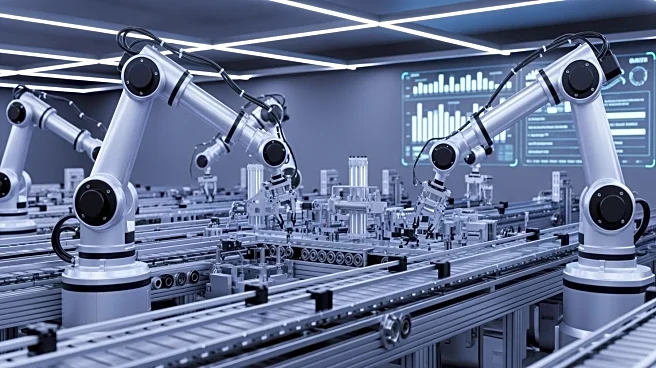What's Happening?
Sage, a prominent player in ERP product marketing, is focusing on enhancing manufacturing efficiency through digital tools and automation. Andy Reid, head of Sage's ERP Product Marketing, highlighted the
role of ERP systems in improving traceability and compliance in manufacturing processes. These systems help manufacturers understand the source and composition of materials, which is crucial for regulatory compliance and efficient recall processes. Additionally, Sage's solutions are aiding manufacturers in managing energy costs and sustainability by providing insights into production inputs and their impact on final products. The company is also addressing supply chain disruptions by promoting reshoring and diversification of supply networks, which are critical in maintaining production continuity.
Why It's Important?
The integration of ERP systems and digital tools in manufacturing is crucial for enhancing productivity and ensuring compliance with evolving regulations. This technological advancement allows manufacturers to streamline operations, reduce waste, and improve supply chain resilience. As manufacturers face rising energy costs and geopolitical disruptions, tools like Sage's ERP systems provide the necessary data insights to adapt and maintain profitability. The focus on automation and digital transformation also addresses the skills shortage in the manufacturing sector by enabling a more efficient workforce that can focus on higher-value tasks. This shift is essential for maintaining competitiveness in a global market.
What's Next?
Manufacturers are expected to continue adopting digital tools and automation to enhance efficiency and compliance. The focus will likely remain on integrating AI and other advanced technologies to foresee production issues and optimize supply chains. As the industry evolves, collaboration between manufacturers and technology providers like Sage will be crucial in addressing challenges related to globalization, labor shortages, and the need for digitalization. The government may also play a role in coordinating innovation and supporting the manufacturing sector through structured initiatives.
Beyond the Headlines
The adoption of digital tools in manufacturing is not just about efficiency but also about transforming the industry's image. By integrating advanced technologies, the sector can attract a new generation of workers interested in innovation and technology-driven careers. This shift could help dispel outdated perceptions of manufacturing as a low-tech, labor-intensive industry. Additionally, the focus on sustainability and energy efficiency aligns with broader societal goals of reducing environmental impact, making the manufacturing sector more appealing to environmentally conscious stakeholders.










